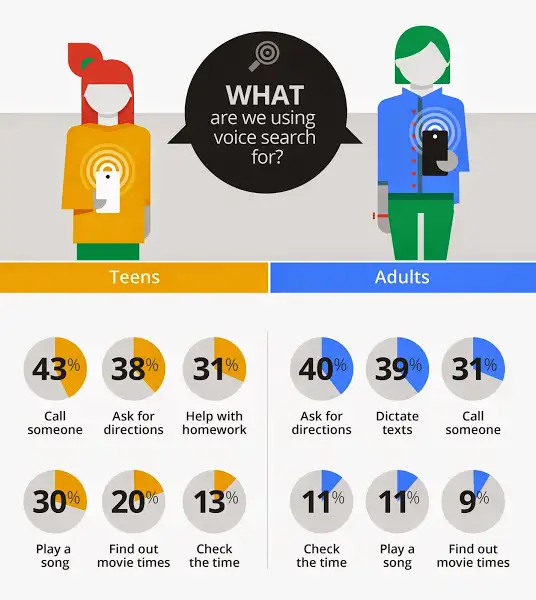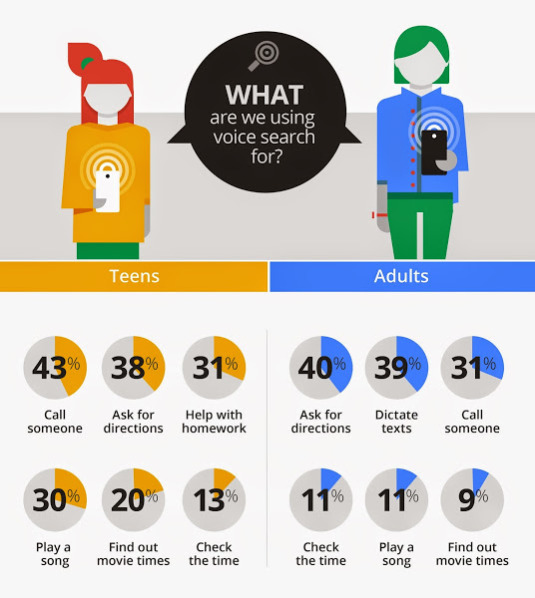Search is currently going through something of a transformation. As Google gets more sophisticated at understanding our search queries, the way we find information is becoming more intuitive and ‘human’.
‘Ok Google, what’s the future of search going to look like?’
Well, instead of clunky keyword searches, we are already beginning to engage our devices in conversation, with longer, semantically-correct search queries.
In a recent blog post, Google revealed that people of all ages are now talking to their devices. Surveying 1,400 Americans across all age groups (in collaboration with Northstar Research) they found that 55% of teens and 41% of adults now use voice search more than once a day.
It appears the stigma of talking to your mobile phone in public is subsiding: the convenience of using Google Voice is too good to resist! You can bake and ask questions without getting your screen crummy; take a bath and Wiki surf without causing water damage; and, for teens especially, Voice is just another friend at the party.
Hamsa is 18 and uses Google Voice to search for YouTube videos. He says, ‘I just use it whenever I can’t be bothered to type. It’s also great for my younger brothers when they want to find Minecraft videos but don’t know how to spell the words. The only problem is I wish it was better at picking up a Scottish accent…’
The evidence suggests that adoption of voice search is increasing, therefore what are the implications for your SEO strategy?
‘OK Google, how do I do keyword optimisation?’
With search engines aiming to create a more conversational experience, keyword optimisation is going to become much more difficult for marketers. Voice search queries tend to be longer and more precise than traditional search terms, and so you need to focus on optimising for more long tail keywords and conversational search queries.
It will still help to employ some of the following strategies though.
- One way to do this is to optimise pages on your website for longer queries – perhaps in an FAQ section. Think of all the questions your website could provide answers to and make sure there is a page dedicated to responding to these questions. Search engines are now looking for websites that provide the best and most specific responses for users: help Google out by becoming the most relevant resource!
- Being number one will become much more important with voice search as Google seeks to provide answers directly, rather than as a list of possible sites that provide answers.
- In terms of your off-site efforts, develop your content marketing strategy around commonly searched-for phrases. But be warned that with voice search this is likely to be much more of a challenge: whereas specific keyword matching can deliver masses of data and results, longer, more natural search queries are likely to generate results that are less common, but much more precise.
- However it’s worth bearing in mind that while queries may be longer, Google will still be able to dissect what is the grammatical fluff from the actual keywords, and so SEO might not change the way you’re expecting it to – there’ll be just as many results and they all might not be as precise. We’ll have to wait and see…
Ultimately the prominence of keyword optimisation will fade. Instead, marketers must learn the exact requirements of their users, and provide content that answers these questions in context.
‘OK Google, should I be going mobile?’
Mobile voice searches has more than doubled in the past year, according to Northstar Research, and so, of course, all SEO content strategies must be optimising for mobile.

A new feature of Google Voice is that it also allows users to ask follow-up questions. This means that if a user discovers your business in their initial search they can also ask for directions, your openings hours, or a phone number, and so be sure all of this information is up to date.
Optimising your online content for mobile is also especially important now that more people are reading and engaging on the go. Ensure your content has a catchy headline, can be read vertically, and is also succinct, to-the-point, and lighter: people don’t want to have to scroll through a 2000 word essay on a tiny mobile device.
For more advice on how to optimise for mobile, get in touch with us.
‘OK Google, what about multilingual SEO?’
A final important point is that with voice search, web users are going to prefer to search in their native language. Therefore going multilingual is a wise move for businesses – especially those looking to target markets in other parts of the world.
For those with a limited knowledge of written English, English-language web content will also become more accessible through voice search. Therefore it may be wise to update your website to ensure it is clear and easy to understand for non-native speakers, with any alternative languages clearly signposted.
You can find out more about our multilingual SEO services here or contacting us directly on +44 (0)800 019 6813.
About the Author
Luke was head of digital at AccuraCast












